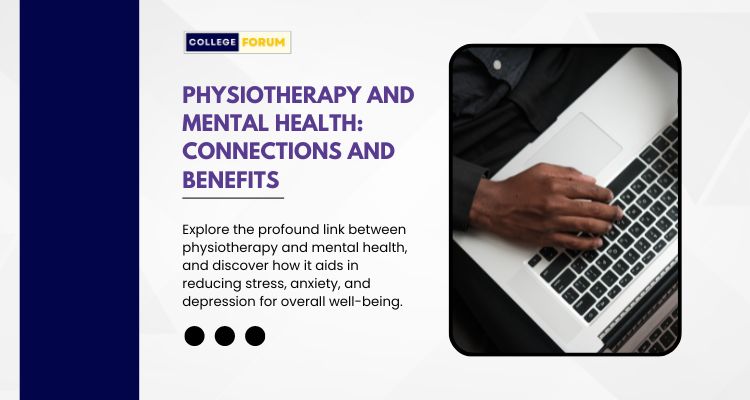Physiotherapy and Mental Health Connections and Benefits
In recent years, the importance of mental health has come to the forefront of public consciousness. With growing awareness, there is a pressing need to explore and understand the various ways through which mental well-being can be enhanced. One such avenue that has gained attention is physiotherapy. While traditionally associated with physical rehabilitation and pain management, physiotherapy has been increasingly recognized for its significant impact on mental health. This blog will delve into the intricate connections between physiotherapy and mental health and how this form of treatment can aid in reducing stress, anxiety, and depression. Understanding Physiotherapy and Mental Health Physiotherapy involves using physical methods such as exercise, manual therapy, and education to promote healing, restore function, and improve overall health. It is widely used to treat various conditions, including musculoskeletal injuries, neurological disorders, and chronic pain. Mental Health encompasses emotional, psychological, and social well-being. It affects how individuals think, feel, and act, influencing their ability to handle stress, relate to others, and make decisions. Common mental health issues include stress, anxiety, depression, and more severe conditions like bipolar disorder and schizophrenia. The Connection Between Physiotherapy and Mental Health Reduction of Physical Symptoms Linked to Mental Health Many mental health conditions manifest physically, with symptoms such as muscle tension, fatigue, headaches, and chronic pain. Physiotherapy can address these symptoms directly through tailored exercises, manual therapy, and other interventions that alleviate physical discomfort. By reducing physical symptoms, physiotherapy can help break the cycle of pain and mental distress, illustrating the profound link between physiotherapy and mental health. Exercise and Endorphin Release Exercise is a cornerstone of physiotherapy and is well-documented for its mental health benefits. Physical activity stimulates the release of endorphins, which are natural mood lifters. These chemicals reduce pain perception and trigger a positive feeling in the body, similar to that of morphine. Regular exercise can help mitigate symptoms of depression and anxiety, improve mood, and boost overall mental well-being. This connection between exercise within physiotherapy and mental health cannot be overstated. Stress Reduction Stress is a significant contributor to various mental health issues. Physiotherapy incorporates relaxation techniques, breathing exercises, and gentle physical activities that can significantly reduce stress levels. Techniques such as progressive muscle relaxation and guided imagery are often used in physiotherapy sessions to promote relaxation and mental calmness. These practices highlight how physiotherapy and mental health are interconnected. Improvement of Sleep Quality Poor sleep is a common symptom of mental health disorders. Physiotherapy can help improve sleep quality through relaxation techniques, stress management strategies, and physical exercise. Better sleep quality is associated with improved mental health, as it enhances cognitive function, emotional regulation, and overall well-being. This further exemplifies the relationship between physiotherapy and mental health. Building Physical Resilience Physiotherapy aims to enhance physical strength, flexibility, and endurance. A stronger, more resilient body can better cope with the physical manifestations of mental health issues. For instance, improved posture and muscle strength can reduce the likelihood of developing chronic pain, which is often associated with stress and anxiety. The emphasis on physical resilience demonstrates another way physiotherapy and mental health are linked. How Physiotherapy Can Aid in Reducing Stress Stress is an inevitable part of life, but chronic stress can have detrimental effects on both physical and mental health. Physiotherapy offers several approaches to manage and reduce stress effectively. Breathing Exercises Controlled breathing exercises are a common component of physiotherapy. Techniques such as diaphragmatic breathing and paced respiration can help activate the parasympathetic nervous system, which promotes relaxation. These exercises can lower heart rate, reduce muscle tension, and create a sense of calm, effectively combating stress. This method shows the direct impact of physiotherapy and mental health improvement. Relaxation Techniques Physiotherapists often teach relaxation techniques such as progressive muscle relaxation, where individuals systematically tense and then relax different muscle groups. This method helps reduce physical tension and promotes mental relaxation, making it a valuable tool for stress management. These techniques further strengthen the bond between physiotherapy and mental health. Exercise Programs Regular physical activity is a proven stress-reliever. Physiotherapists can design personalized exercise programs that incorporate aerobic exercises, strength training, and flexibility exercises. These programs not only improve physical fitness but also enhance mood and reduce stress levels. These exercise programs are a testament to the benefits of physiotherapy and mental health synergy. Manual Therapy Manual therapy, including massage and joint mobilization, can help release physical tension and alleviate stress. The therapeutic touch provided by physiotherapists can promote relaxation and enhance the overall sense of well-being. Manual therapy is a clear example of how physiotherapy and mental health are interwoven. Physiotherapy and Anxiety: A Therapeutic Approach Anxiety disorders are among the most common mental health conditions, characterized by excessive fear, worry, and nervousness. Physiotherapy can play a pivotal role in managing anxiety through various interventions. Movement Therapy Movement therapies, such as yoga and Tai Chi, are often integrated into physiotherapy programs. These practices combine physical movement with mindfulness and deep breathing, helping to reduce anxiety levels. The focus on controlled movement and mental presence can provide a grounding effect, reducing anxiety symptoms. Movement therapy highlights the therapeutic nature of physiotherapy and mental health. Biofeedback Biofeedback is a technique used in physiotherapy to help individuals gain awareness and control over physiological functions. By using sensors to monitor physiological responses like heart rate and muscle tension, individuals can learn to regulate their body’s responses to anxiety, reducing the overall impact of anxiety on their mental health. Biofeedback is another clear example of the relationship between physiotherapy and mental health. Cognitive-Behavioral Techniques Some physiotherapists incorporate cognitive-behavioral techniques into their practice. These techniques help individuals identify and challenge negative thought patterns that contribute to anxiety. By promoting positive thinking and coping strategies, physiotherapy can reduce the cognitive aspects of anxiety. This incorporation showcases how physiotherapy and mental health are closely related. Addressing Depression Through Physiotherapy Depression is a serious mental health condition that affects millions of people worldwide. It can lead to a persistent feeling of sadness, loss of interest
Physiotherapy and Mental Health Connections and Benefits Read More »









